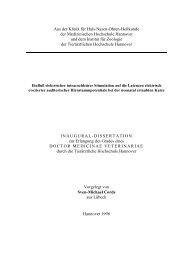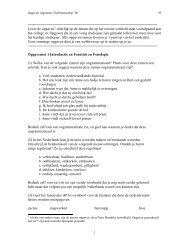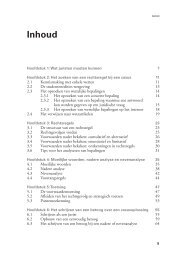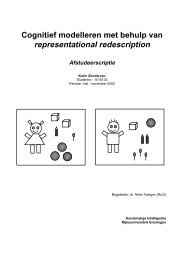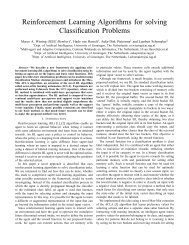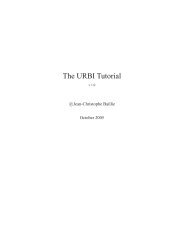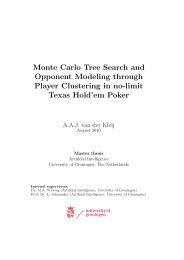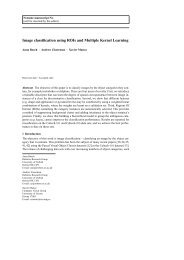Presuppositions in Spoken Discourse
Presuppositions in Spoken Discourse
Presuppositions in Spoken Discourse
Create successful ePaper yourself
Turn your PDF publications into a flip-book with our unique Google optimized e-Paper software.
Accommodation and Presupposition<br />
In summary, the assumption that higher levels of accommodation will be<br />
preferred over lower levels cannot be well motivated by us<strong>in</strong>g decontextualized<br />
examples, nor have any of the theoretical explanations for this proposed preference<br />
been entirely conv<strong>in</strong>c<strong>in</strong>g. The corpus results supply, albeit weak, support for an<br />
alternative proposal that tendencies to accommodate at different levels has to do<br />
with the tendency for a trigger to occur under certa<strong>in</strong> types of embedd<strong>in</strong>g, the<br />
function of the presupposition trigger, and <strong>in</strong> some cases its relation to the asserted<br />
<strong>in</strong>formation associated with the trigger and the ability of the presupposed<br />
<strong>in</strong>formation to be the focus of the message communicated. An explanation along<br />
these l<strong>in</strong>es could perhaps relate tendency to be accommodated globally with<br />
tendency to communicate hearer-new <strong>in</strong>formation. These ideas can certa<strong>in</strong>ly be<br />
developed more, but I hope I have conv<strong>in</strong>ced the reader to enterta<strong>in</strong> at least the<br />
possibility of an alternative to the proposed general preference for higher levels of<br />
accommodation.<br />
5.5 SUMMARY<br />
This chapter discussed the conditions for accommodation; when it can occur, how<br />
it occurs and why it is used. These questions have been discussed <strong>in</strong> the literature <strong>in</strong><br />
reference to made up examples. Here I tried to related them to the corpus data and<br />
use it as a basis to discuss three theoretical questions <strong>in</strong> presupposition theory.<br />
The first question discussed dealt with how often presuppositions were used<br />
to present hearer-new <strong>in</strong>formation, and looked more closely at the use of factive<br />
verbs <strong>in</strong> the corpus. It seems that factive verbs are used the majority of the time to<br />
present <strong>in</strong>formation that the speaker believes is new to the hearer.<br />
The second question discussed was what licenses accommodation for<br />
presuppositions, and what prevents it <strong>in</strong> traditional anaphors. The two ma<strong>in</strong><br />
explanations <strong>in</strong> the literature, van der Sandt‘s (1992) account based on descriptive<br />
content, and Blutner’s and Zeevat‘s proposal that it has someth<strong>in</strong>g to do with the<br />
availability of non-presuppos<strong>in</strong>g alternatives, were both shown to be unable to<br />
account for all of the data <strong>in</strong> a conv<strong>in</strong>c<strong>in</strong>g way. There were also great differences <strong>in</strong><br />
what explanation worked for which trigger which suggests that the licens<strong>in</strong>g of<br />
accommodation is a much more heterogeneous phenomena than it is perhaps<br />
portrayed. Context also plays a large role <strong>in</strong> the felicitousness of accommodation,<br />
and we can see that accommodated presuppositions were often l<strong>in</strong>ked to the<br />
discourse record <strong>in</strong> the corpus examples.<br />
The third question discussed was the proposed preference for presupposed<br />
<strong>in</strong>formation to be accommodated at the highest level possible. I po<strong>in</strong>t out that the<br />
proposed preference is not entirely supported by the corpus data, and that current<br />
explanations still do not adequately account for why this preference should hold.<br />
Instead, I argue that there is no general preference for global accommodation that<br />
applies to all triggers and under all types of embedd<strong>in</strong>g, and that while<br />
presupposition triggers all have the same potentials they are not are functionally<br />
used with all their potentials and that this is <strong>in</strong> part due to their semantic types, the<br />
149



